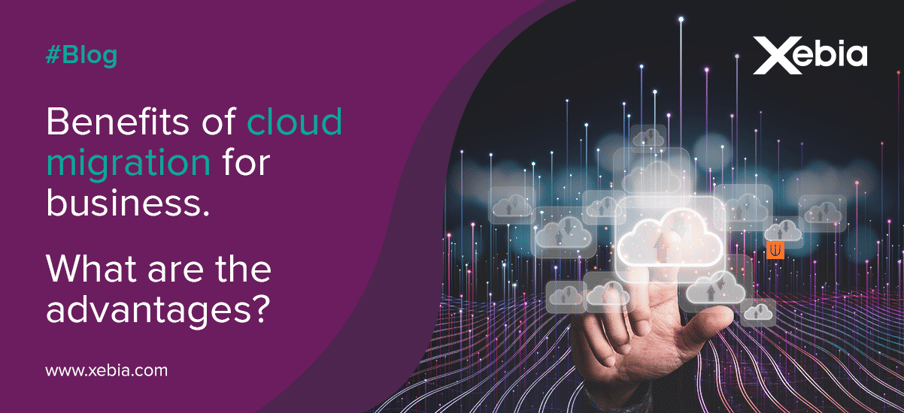Migrating to the Cloud is like getting married. It’s a life-changing decision. It takes time to organize. And, finally... it isn’t the best choice for everybody! However, if you marry the right person migrate smartly, you give your business the chance to live happily ever after.
So, it's understandable if you’re still reluctant to embrace Cloud Computing. To help you re-assess if migrating to the Cloud is the right decision for you – especially from the perspective of your business needs – in this article, we’re taking a closer look at the Cloud’s core benefits.

Table of Content:
Why Companies Migrate to the Cloud
- Financial Benefits of Cloud Migration
- Enhanced Flexibility of the Business
- Better Mobility of Employees
Consider Migrating to The Cloud Today
What is a Cloud Migration?
But first, let’s reiterate what Cloud Migration is, exactly.
In today's world, Cloud solutions are everywhere. Starting with digital products that many people use daily – like Zoom, Office 365, Google Drive, Gmail, or Sharepoint – Cloud solutions empower more key elements of the virtual world than most people realize.
For some time now, Cloud Computing plays a critical role in optimizing business operations. This year already, 2/3 of enterprise infrastructure is predicted to be Cloud-based.
So, to answer the main question:
Cloud Migration is the process of moving applications, databases, and IT processes to the Cloud. As a result, these recources become available through the web from (nearly) anywhere. Cloud Migration typically means moving data and tools from legacy infrastructure or an on-premises data centre to the Cloud.
Why Companies Migrate to the Cloud
We’ll start with a trivial remark – companies migrate to the Cloud for a myriad of reasons. Cloud Computing has the potential to deliver dozens of very different benefits, helping businesses in multiple areas. So much so, that a few years ago one of our experts wrote a two-part commentary solely concentrating on Cloud Computing benefits.
In this article, however, we won’t name all the perks. Instead, we'll concentrate on the very core of Cloud Computing benefits. The goal is to give you a general idea – a good starting point in your decision making. We'll also approach the benefits from the perspective of the public Cloud since it will likely be the first Cloud deployment type you’ll consider.
Remember that the precise benefits depend on various factors – like an organization’s way of operating, the business model, or the industry it operates in. But, overall, the benefits usually include a reduced cost of ownership (TCO), a swifter time to delivery, or higher flexibility. What’s more, Cloud Migration typically serves as a driveway to further innovation (and that way leads to even more benefits).
So, let’s take a look at each of these traits.
Financial Benefits of Cloud Migration
Cost-related aspects are commonly the first reason why businesses decide to move to the Cloud.
At first, Cloud Computing may sound like an expensive affair. However, there’s a key factor that makes it affordable – the idea of multitenancy. Since a Cloud provider offers their clients a part (share) of the same computing power, the idea is sometimes compared to sharing an apartment building. One person usually can’t afford the whole block, but one apartment is typically all they need. And that makes it a hundred (or more) times cheaper than renting the entire building. Similarly, a part of computing power will usually suffice – and it will be affordable.
Additionally, with the public Cloud, the need for new hardware is gone. The equipment is handled by the Cloud vendor. What’s more, without the need to maintain on-premises hardware, companies can save space and limit their spending on power. Although not life-changing for big enterprises, these additional benefits can be pivotal to smaller companies that plan to grow rapidly (and need some savings).
ZNetLive compares this to taking an Uber. You only pay for the travelled distance. And you don’t have to own an automobile to get to your destination. If the car breaks down, it’s not your concern; you don’t own it. Similarly, in the case of Cloud Computing, the vendor pays for repairs and maintenance.
Enhanced Flexibility of the Business
This benefit can be approached from a few perspectives. First, your office – if you have one – isn’t tied up in one place like a factory or nuclear power plant. Since all the crucial data is stored online, in the Cloud, you don’t have to worry about a huge transition when you want to move (because, for example, your business is growing). You just need to take your desks and computers and start working elsewhere.
From a more technical perspective, the Cloud’s flexibility enables you to only pay for the resources you use. With Cloud Computing, you’re able to freely choose how much computing power you need.
Generally, Cloud vendors allow customers to increase or decrease their computing resources on the go. As a result, you don’t have to maintain and pay for IT assets that may only be occasionally useful.
To take full advantage of this benefit, you should plan your Cloud migration well. Most importantly, you should try to assess how much power you will be using in the future. It may be difficult to plan ahead, but it’s important to stress that such estimations should be done as diligently as possible. Cloud environments are dynamic; their costs can change as you adopt new services and the usage of your apps grows.
Better Mobility of Employees
Cloud Computing enables you and your team members to work safely from many places across the globe. This is possible thanks to a seamless information flow across locations and devices. As a result, the Cloud empowers remote operations (so needed in the current landscape) like no other technology. With the Cloud, companies can go full remote – which is unimaginable otherwise (unless you’re operating a multi-level marketing/pyramid scheme; but we really hope you're not).
So, because of Cloud Computing, employees can operate with more flexibility and mobility, both out and in the workplace (if there even is one).
With Cloud Computing, you can access work files easily on a laptop or smartphone. Documents are shareable simultaneously over the internet, elevating the ease of collaboration (to a level incomparable even to face-to-face meetings in front of a whiteboard).
And hey – who wouldn’t want to work from the beaches of Aruba? (Assuming the internet connection there is good enough).
When Should You Not Migrate to the Cloud?
Finally, as we’ve mentioned in the intro, the Cloud isn’t necessarily for everyone. If all your friends are getting married, and you’re the only bachelorette/bachelor left in your pack, it doesn’t mean you should instantly look for the first available husband or wife on Tinder.
No, you should only get married when you need US citizenship you feel it’s the right decision. With the Cloud, the right decision to move is only when the business case justifies it.
At first glance, the Cloud may often look like the ideal solution when compared to a data centre. However, Cloud Computing isn’t a technological panacea that will solve all your business problems. It's an immensily useful technology, but it should be used with a plan in mind.
Playing devil’s advocate, let's now look at a few scenarios when it's temporarily NOT a good idea to move to the Cloud.
- Not sure about security. The Cloud, at its core, is safe. However, misconfiguration or trusting an inexperienced vendor may have dire consequences. That’s why you should first assess the risks.
- Likely connection issues. When you migrate to the Cloud, your business starts to rely heavily on the power of the internet. So, if you’re operating at a place that is experiencing regular network connectivity issues, the Cloud may not be a smart choice. Before you migrate to the Cloud, you may need to migrate to another office.
- Cost and ROI. With a poorly planned Cloud Computing power usage, you may lose money – not save it. That’s why you should first calculate diligently if the migration makes financial sense. There are numerous factors to consider – like recuring provider fees, rising needs, and more.
Yet, even with those things to consider, the Cloud turns out to be the way to go in most cases.
Consider Migrating to The Cloud Today
A few years back, the Cloud has been considered an advantage. However, in 2022, it’s not an asset anymore. It's often a necessity.
So, don’t fall behind. Start by preparing an inventory of your IT portfolio and analyze which applications and systems would deliver the most benefits if migrated.





